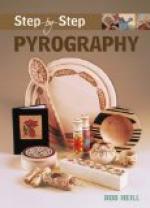It was a mosaic floor of tiny blocks of red, black, yellow, white, brown, cream and slate-blue, set in cement so strong that not an inch of the fine even surface had warped. It was not a large pavement, and might have been the floor of a small dining or sitting-room so placed as to command a view of the valley. A part of one wall remained. It had been plastered and then covered with a finer plaster which was frescoed with a row of painted pillars against the deep marvelous red of Pompeii. The design of the floor was not at first clear. The edge was decorated with a conventional pattern in gray and white. The corners were cut off by diagonal lines making an eight-sided central space. This was outlined by a guilloche, or border of intertwining bands of brilliant colors. Inside this again was a circle divided into alternate square and triangular spaces with still brighter borders, containing each some bird or animal. In the central space was a seated figure playing on a harp, while around him were packed in a close group a lion, a ram, a bull, a goat, a crab, fishes, and other figures. Nobody at first saw what it could be.
“If I mistake not,” said the little stout man, Martin Bouvin, at last, “it is Sir Orpheus playing to the beasts.”
“To be sure!” cried Guy Bouverel. “Do you know books as well as cooking-pots, O man of the oldest profession?”
Martin grinned. “I heard a song about that once,” he answered, “and I have never forgotten it. It was a lucky song—for some folk.”
It was fortunate that at that time of year the sun does not set until after eight o’clock, for no one could have borne to leave that pavement without seeing the whole of it. The children, quite forgotten for once in their lives, grubbed in the piles of earth and found bewitching bronze lion-heads and ornamental knobs and handles, and pictured tiles. At last they all went in to a very late supper. All the guests could be sheltered at Wilfrid’s home if the young men were satisfied to lodge in Cold Harbor.
“It is like finding out the people who lived here when the land was young,” said Wilfrid, his eyes very bright.
“And there were also the men who made the dewponds,” mused Master Gay.
“And there were those Druids of whom my father told me,” said Josian wonderingly. “This is like a fairy tale, Al-an. Is York the same?”
“Brother Basil said once that our England is a land of lost kingdoms,” Alan answered her. “I see what he meant.”
Excavation went on during the following days until all the pavements of the old Roman house had been cleared. The two others were larger but not so fine as the first they had uncovered. One was of stone blocks laid in a sort of checkerboard pattern, and the other of mosaic in a conventional pattern of black and gray and brown and red. They found that under these floors there was an open space about two feet high. The tiled floor which was covered




